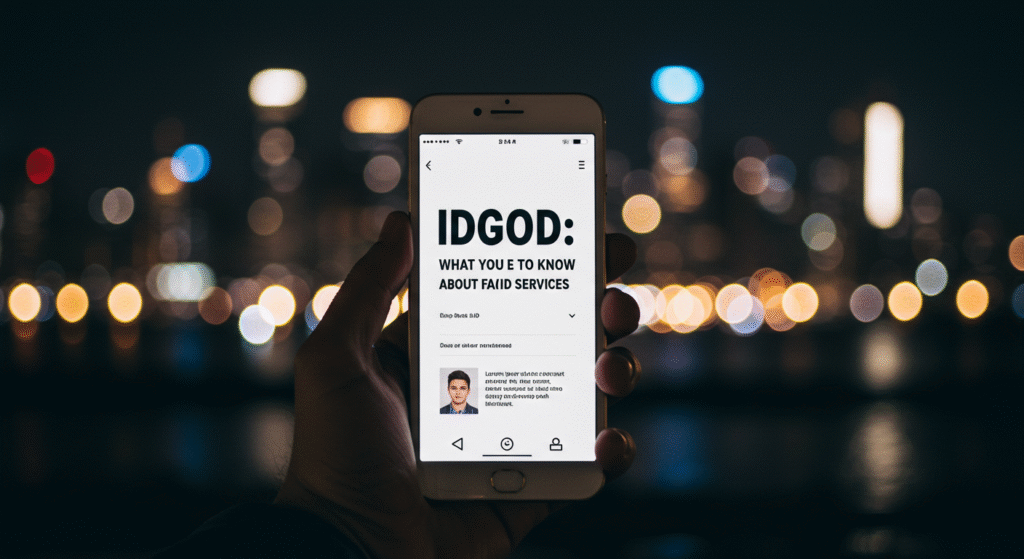In recent years, the term IDGod has surfaced frequently in online conversations, especially among young adults and college students. Often associated with the underground market for fake identification cards, IDGod refers to a network of websites and vendors that allegedly produce scannable fake IDs—often mimicking U.S. state driver’s licenses and international documents.
While these services may seem like a convenient way to bypass age restrictions, they come with significant legal risks, security concerns, and ethical implications. This article explores what IDGod is, how it operates, and why using fake ID services is far more dangerous than many realize.
What Is IDGod?
IDGod is a name commonly associated with websites and dark web vendors that manufacture and sell fake IDs. While it’s unclear if there’s a single group behind the brand, many copycat websites have used the “IDGod” label since the early 2000s.
Historically, IDGod was believed to originate in China, where fake IDs were mass-produced and shipped globally. Over time, the name evolved into a general term representing online fake ID sellers that promise:
-
Realistic visuals
-
Scannable barcodes
-
Holograms and state seals
-
Magnetic strip encoding
Despite how “legit” these services may appear on their websites, the operation is illegal in most jurisdictions—and getting caught with one can result in serious criminal charges.
How IDGod Websites Work
IDGod-style websites typically function like e-commerce stores. Users are prompted to:
-
Choose a State or Country
Select the design of the fake ID (e.g., California, Texas, New York, etc.). -
Enter Personal Details
Upload a photo, signature, and personal information to customize the ID. -
Place an Order and Pay
Payment is often accepted through untraceable methods like Bitcoin or cryptocurrency, and sometimes through risky platforms like prepaid cards. -
Wait for Delivery
IDs are shipped in disguised packaging to avoid customs seizure, often using international shipping routes.
These sites claim to offer “stealth shipping” and discreet delivery to reduce the chance of interception. However, buyers risk losing their money, facing law enforcement scrutiny, or receiving substandard products.
Legal Risks of Using IDGod
Possessing or using a fake ID is a criminal offense in most parts of the world—including the United States. Here’s what the law says:
Possession of a Fake ID
Simply possessing a forged government-issued identification document can be classified as a misdemeanor or felony, depending on your state and intent.
Use to Purchase Alcohol or Enter Venues
Using a fake ID to buy alcohol, enter a bar, or access age-restricted services is illegal and can lead to:
-
Fines
-
License suspension
-
Community service
-
Criminal charges
-
Permanent record (especially for repeat offenses)
Fraudulent Identity Use
If the ID contains someone else’s real information (identity theft), charges can escalate to fraud or impersonation, which carry heavier penalties.
In colleges and universities, getting caught with a fake ID can also result in expulsion, suspension, or loss of scholarships.
Why IDGod Is Risky for Buyers
Beyond the legal consequences, using IDGod services presents several security and financial risks:
Scams and Non-Delivery
There are countless fake ID websites pretending to be IDGod. Many simply take your money and never deliver, especially those without verified user reviews.
Personal Data Theft
Providing sensitive personal information and photographs to an anonymous website creates a real risk of identity theft, phishing, or even blackmail.
Customs Seizures and Tracking
Packages that appear suspicious may be flagged and seized by customs. In some cases, law enforcement agencies have traced orders to prosecute buyers.
Low-Quality IDs
Despite advertising “scannable” IDs, many products don’t pass barcode scans, blacklight tests, or magnetic strip checks used by modern ID verification tools.
The Rise and Fall of the Original IDGod
The original IDGod brand dates back to the early 2000s and was once one of the most notorious names in the fake ID market. At its peak, the group behind it was said to produce thousands of IDs per month, serving college students and underage individuals globally.
Over the years, law enforcement agencies—including the U.S. Department of Homeland Security—conducted stings and cracked down on fake ID rings. Several domains were shut down, and some individuals associated with IDGod were arrested and charged.
Since then, copycat sites have emerged, using the name “IDGod” to attract attention, but many are fraudulent or operated by different vendors with no connection to the original network.
Are There Legal Alternatives?
Yes. If you need identification for legitimate reasons—such as verifying your age or proving your identity—always go through legal channels. These include:
-
DMV (Department of Motor Vehicles) for a driver’s license or state ID
-
Passport offices for government-issued ID for travel
-
School or workplace ID programs
For events or venues requiring ID, you can often contact the organizers to ask if alternative verification methods are acceptable.
Final Thoughts
While the idea of using IDGod or similar services to obtain a fake ID might seem harmless or even exciting to some, the reality is much more serious. From legal consequences to personal security risks, the use of fake IDs comes with high stakes that can affect your future education, employment, and reputation.
In today’s digital world, where identity fraud and cybercrime are more common than ever, handing over your private data to anonymous sources is a major gamble. The short-term benefit is far outweighed by the long-term risk.







